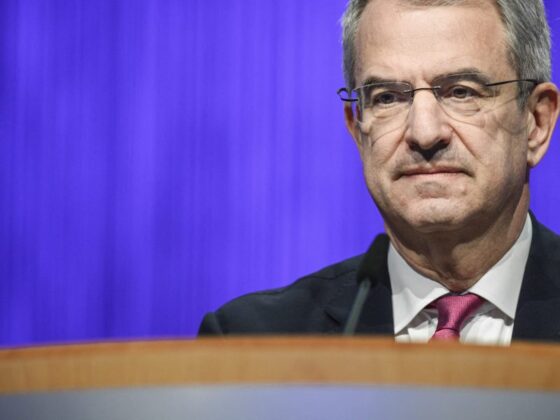Unlock the Editor’s Digest for free
Roula Khalaf, Editor of the FT, selects her favourite stories in this weekly newsletter.
Whispering to the camera while standing in a dark French park this month, Robert Jenrick bore as much resemblance to an online “migrant hunter” as a traditional Conservative politician. “They are hiding just behind these trees here,” said the shadow justice secretary, gesturing towards a group he had followed from a migrant camp.
While at the camp, he had filmed and interviewed men waiting to cross the English channel, before running away after apparently being pelted with bottles. The video was the latest instalment of a carefully constructed social media campaign by Jenrick, 43, who was beaten to the Tory leadership last year by Kemi Badenoch. Rather than disappear quietly into the ranks of the shadow cabinet, he has loudly positioned himself in the same territory as Nigel Farage’s Reform party, courting controversy and stepping up his hardline anti-immigration rhetoric during this summer’s asylum hotel protests.
Throughout, Jenrick has kept his presence alive in the minds of a Tory membership unsure about Badenoch and worried about the party’s floundering place in the polls. “He’s making huge waves with his social media stuff,” said Tim Bale, professor of politics at Queen Mary University of London, “and by trying to generally give the impression they should have picked him rather than her.” An August ranking of the shadow cabinet among readers of the Conservative Home news website places Jenrick far ahead of his colleagues. “The shadow justice secretary’s popularity has become entrenched,” noted an editorial.
As protests at hotels for asylum seekers proliferate, Jenrick’s brand of politics is gaining momentum, though some Conservative MPs fear that he is leading the party into murky waters it may struggle to escape. A judge’s temporary injunction this week ruled asylum seekers must leave their government-provided accommodation at the Bell Hotel in Epping — the epicentre of protests after an asylum seeker staying in the hotel was charged with sexually assaulting a 14-year-old girl.
Amid the furore Jenrick, who has three young daughters, wrote an article in the Mail on Sunday stating that he did not want his children “to share a neighbourhood with men from backward countries who broke into Britain illegally and about whom we know next to nothing”. Jenrick does not accept allegations he’s swimming in dangerously murky waters. He demanded and won an apology from the BBC after a radio show suggested he had displayed “xenophobia” in his Mail on Sunday article.
YouGov polling shows that over 70 per cent of Britons think migration levels are too high, up from around 60 per cent in 2020. It also shows that respondents wildly overestimated how much immigration is “illegal”. Small boat arrivals, even as they hit record levels, remain a single-digit percentage of the total.
Jenrick’s ability to seize the moment has helped turn him into a once unlikely radical. Former minister Michael Gove once warned that his great weakness was looking like “a typical Tory politician”. Early in his political career he was broadly viewed as a pudgy “Tory boy” with largely centre-right views. But he has become the one person who appears rejuvenated by the Conservative’s loss of power.
Slimmed down thanks to a combination of weight training, running and Ozempic, which helped him ditch his much-loved Chinese takeaways, his cheekbones are now as sharp as some of his more controversial views. Allies say that while his populist push is getting Conservatives some badly needed headlines, what Jenrick really wants is a full-scale transformation of the British state after his time in government, including as immigration minister, left him deeply disillusioned. “He was radicalised by seeing the state up close, trying to pull levers that weren’t there,” one ally said. “Basic things were impossible. He realised it was totally broken.”
People close to him say his views also shifted around the time of October 7 2023, when pro-Palestinian protests erupted in UK cities even before Israel launched its devastating response to the massacre that day. “Seeing such open support for Hamas and the Houthis and an outpouring of anti-British and antisemitic sentiment really hit home,” one ally says. “It didn’t feel anything like the Britain he grew up in.” Jenrick has taken to talking up his everyman roots in order to broaden his public appeal, pointing out that before marrying his wife, Michal Berkner — an Israeli-born, American-raised corporate lawyer who is now a British citizen — he was not particularly wealthy.
He grew up in a lower-middle class family in Wolverhampton, where he and his sister were the first in their family to go to university. His 85-year-old father still runs the fireplace fitting business he founded, and Jenrick wants a pro entrepreneurial society to help break the UK out of its economic torpor. “The battleground now isn’t simply left versus right: it’s tinkerers like Starmer versus those who think we need radical change,” the Jenrick ally said.
Supporters also argue that his politics on immigration centre not on race but fairness, pointing out that he fought to resettle Afghan interpreters who worked with the British army. His use of social media has helped him reach a broad audience, including across the Atlantic. He sat down with JD Vance during the US vice-president’s recent visit to the Cotswolds.
Allies claim even Labour rivals have congratulated him on his recent viral tube fare dodging video, in which he confronted people who pushed through the barriers on the London underground. Shadow cabinet colleagues have started to copy him. Chris Philp, the shadow home secretary, released his own video of a visit to a French migrant camp last week.
It is not yet clear whether this will be enough to help the Conservatives stave off the existential crisis posed by Reform. There was once talk that Jenrick might be a bridge between the two parties to “unite the right” although allies point out he’s a Tory through and through. He gave one of his daughters the middle name “Thatcher”. Farage has said Jenrick might end up to the right of him on immigration by the next general election.
On Wednesday, Jenrick was out hanging British flags from lampposts, lending his support to a viral online trend designed to expose councils’ alleged “two-tier” approach to patriotism. “While Britain-hating councils take down our own flags”, Jenrick posted on X, “we raise them up”.
[email protected], [email protected]
This article has been amended after publication to correct the spelling of Chris Philp’s name













